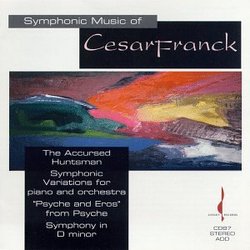| All Artists: Cesar Franck, Massimo Freccia, Georges Prêtre, Adrian Boult, RCA Victor Orchestra, RCA Victor Symphony Orchestra, Royal Philharmonic Orchestra, London Orchestra Society, Earl Wild Title: Symphonic Music of Cesar Franck Members Wishing: 0 Total Copies: 0 Label: Chesky Records Release Date: 1/18/1993 Genre: Classical Styles: Forms & Genres, Concertos, Theatrical, Incidental & Program Music, Historical Periods, Modern, 20th, & 21st Century, Instruments, Keyboard, Symphonies Number of Discs: 1 SwapaCD Credits: 1 UPC: 090368008725 |
Search - Cesar Franck, Massimo Freccia, Georges Prêtre :: Symphonic Music of Cesar Franck
 | Cesar Franck, Massimo Freccia, Georges Prêtre Symphonic Music of Cesar Franck Genre: Classical
|
Larger Image |
CD Details |
CD ReviewsFRANKLY FRANCK Melvyn M. Sobel | Freeport (Long Island), New York | 02/19/2003 (5 out of 5 stars) "Culled from recordings dating back to1960-68, Chesky has compiled a very generous selection of mainstay orchestral works by Cesar Franck [1822-1890], including the attractive symphonic fragment, "Psyche and Eros," a decided bonus. This appealing CD would be noteworthy if for no other reason than having so much penultimate Franck at one's fingertips. However, the appeal is hardly limited to this alone. We are also treated to excellent performances and riveting interpretations.A fine example of the latter is Freccia's exciting, roustabout rendition of The Accursed Huntsman, replete with hair-raising brass, ominous tolling bells, and fervent romantic sweep. The RCA Victor Symphony Orchestra keeps brilliantly apace. [1968]In the Symphonic Variations, Freccia and the RCA VSO accompany pianist Earl Wild in a warmly engaging performance that emphasizes Franck's charming lyricism rather than bravura. Wild's gentle wending way is hypnotic: in full chordal passages his manner is never aggressive, and in meditative sections his touch is like a whisper. Wild's poetic vision of the Variations is the most personal I have ever heard, and a beauty. [1968]"Psyche and Eros," extracted from Psyche, the composer's large-scale endeavor for chorus and orchestra, and rarely heard in other than fragments, is a pleasing melodic segue, especially idiomatic under Pretre and the Royal Philharmonic Orchestra. [1963]But Franck's masterpiece Symphony in D minor remains the virtual core of his output, its contrasting ideas, repeating motifs and evocative orchestration still luminous. Under Sir Adrian Boult, the London Orchestra Society, in what to me sounds like a live recording, but I could be mistaken, tackles the work with aplomb. The opening Lento/Allegro, at over sixteen minutes, is a perfectly shaped mood piece of darkness and light beautifully balanced. The central Allegretto continues subdued and mysterious, yet maintaining an underlying tension, released in the recapitulative popular Allegro finale. All told, Boult's reading is unique, committed and romantic, if, unfortunately, hindered by somewhat dated sound. However, the ear adjusts, and the wisdom of the conductor's seamless grip fascinates. [1960][Running time: 75:58]"
|

 Track Listings (6) - Disc #1
Track Listings (6) - Disc #1